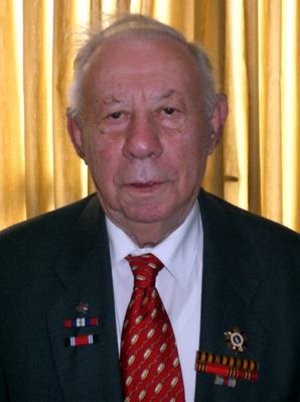Iosif Galitskii (or Józef Galicki in Polish) was born in 1922 in the town of Ostróg, or Ostroh, Volhynia. The town was located right on the Polish-Soviet border (on the Polish side). His family was Zionist by conviction, and Iosif spoke Hebrew from childhood. He graduated from a gymnasium of the Tarbut network, where the teaching was conducted in Hebrew.
In September 1939 eastern Poland was annexed by the Soviets, and Ostroh became part of Ukraine. In June 1941, the Soviet-German war began and, on July 3, 1941, the Germans entered Ostroh. Iosif miraculously survived three Nazi murder oprerations – in August, in September, and in October 1941. Between the second and the third operations, a ghetto was established in Ostroh, and Iosif was incarcerated in it. A short time after the third mass murder, realizing that the Germans had learned how to find the shelters in which the Jews were hiding, Iosif fled from the ghetto. After wandering in Ukrainian villages and in the forest, in the spring of 1942, Galitskii found some Soviet partisans and joined them. This unit of Soviet partisans, like others, was not inclined to accept Jews, but it turned out that the unit's commander Anton Odukha had studied at the same school as Iosif's mother and remembered her well. Her son recalled: "Thus, after her death my mother Feige once more rescued the life of her Buzie [Iosif's nickname]."[1] Galiltskii became a member of a sabotage squad and, in that capacity, fought with Odukha's partisan unit until February 1944. He noted that every time that he planted explosives, he felt that he was taking revenge for his father, his mother, his younger brother, and other Jews.
In February 1944 Odukha's unit entered Ostroh at the same time as the Red Army. Galitskii was drafted into the Red Army after being sent to a military engineering school to learn sabotage skills. In June 1944, as a specialist in explosives Galitskii was assigned to a separate engineering battalion of the 1st Belorussian Front. With this battalion, he fought in Poland, where he took part in the capture of Warsaw in January 1945, and then he fought in Germany. Galitskii was awarded two military orders (the Order of Glory, 3rd and 2nd Class) and several medals, including "For the Liberation of Warsaw." His Order of Glory, 3rd Class, was awarded after he succeeded in pulling his wounded regiment commander from the field under enemy fire. He earned his Order of Glory, 2nd Class, during the forcing of the Oder River in January 1945. During the night the commander seated sappers as oarsmen in big rubber boats and each of them had to make three trips under fire to transferring Soviet infantrymen to the German-occupied side of the river. Under heavy enemy fire, it was considered that three crossings were quite enough for an oarsman on the assumption that during them there was a good chance that he would be either killed or wounded. If one of them survived three trips, he was replaced by a fresh oarsman. However, Galitskii refused to be replaced and made nine trips. During the first days of May 1945 Galitskii was in Berlin. He noted that he left the following signature on a wall of the Reichstag: "Józef Galicki, Jude."
Victory found him in Magdeburg. Just on VE-Day Galitskii was wounded by some Germans who had not laid down their weapons after the surrender of the Wehrmacht. His injury proved to be serious and, after being released from hospital, Galitskii was demobilized.
Upon his return to Ostroh, Galitskii married another war veteran, a former military nurse named Riva (Rebecca). Although he was well received in the town (he was recommend for the position of director of a state enterprise for the preservation of vegetables and fruits), upon their marriage the young couple requested to be repatriated to Poland, from which they attempted to reach Palestine. Their ship "The Yagur" landed in Haifa in December 1946. However, the British immediately arrested them, along with the other would-be Jewish immigrants, as "illegals." Consequently Riva gave birth to their first child in the Atlit prison. The boy was named Ben-Tsion, in memory of Iosif's father, who had been killed in Ostroh.
Galitskii took part in the Israel's War for Independence in 1948. After the war, he settled in Rehovot. He served as vice-mayor of the city from 1989 to 1994.
From an interview given by Iosif Galitskii in 2010
"Every day, at least one group of three people was sent or even several groups were sent at once, on a mission to sabotage the railway. I wanted to take full revenge for my family members who had been shot to death by the Germans, and I volunteered for any assignment, even when it was not my turn. Therefore, I was always engaged in sabotaging railways... I enjoyed taking revenge, crushing these German reptiles, exterminating them as best as I could, but to the very end of the war, it always seemed to me that I had not yet killed enough of them, that my account with the Germans was not yet closed".[…]
"Question.: Did you keep your own combat account?
Iosif Galitskii: - How can I answer that? ... I killed many Germans during the war, but I have no desire now to talk about this in detail. I took revenge for my family, for my people, and for my fallen partisan and army comrades ... I took revenge and I believed that I would live to see the time when I came to the mass grave of Jews from Ostroh and would there say - "I avenged you!" ..."
[1] Pomni! Zkhor!: Vospominaniia o Kholokoste byvshikh uznikov getto i kontslagerei. Rehovot, 2013, p. 74.







